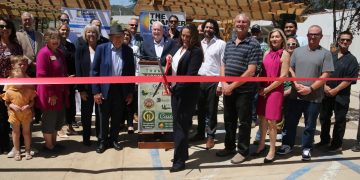
An appeal by the Pacific Beach Denny’s restaurant to reconsider its application for a beer and wine license from the California Department of Alcohol Beverage Control (ABC) was rejected by the same state licensing agency.
The application was denied last year, but the restaurant at 800 Garnet Ave., which has been in operation since 1968, was granted a hearing to appeal the decision. Following the Jan. 8 hearing, the ABC’s Administrative Law Judge determined several factors:
• The restaurant is located in an area with nearly six times the citywide average for crime;
• Under state law, the geographic area there should have two “on sale” licenses where alcohol is served; this area already has 24 of those license;
• Neighbors were concerned that adding another alcohol outlet would make crime problems worse;
• The San Diego Police Department also protested the license because “issuing another license will only create an additional drain on the very limited police resources;”
• Issuance of the license will tend to create or aggravate a law-enforcement problem in the area.
• The issuance of the license would interfere with nearby residents’ quiet enjoyment of their property.
The administrative law Judge recommended denial of the license application Jan. 24. That decision was reviewed and adopted by the ABC’s General Counsel. The decision was certified Feb. 14. The applicant has 30 days to appeal the decision.
Michael Manos, a retired San Diego sheriff’s deputy who owns the Pacific Beach Denny’s restaurant, said he probably wouldn’t appeal, despite his disappointment.
Nonetheless, Manos said he believes there should be a different category — and criteria — for judging a liquor license application for a restaurant like his, which would sell alcohol as a supplement, as opposed to a bar, whose staple is alcohol sales.
“They made it sound like we wanted to start selling a lot of liquor, when our application was simply for beer and wine as a customer convenience incidental to their meal purchase,” said Manos. “We never intended to sell beer and wine as a mainstay as a bar would. We wouldn’t have sold as much beer in one week as a nightclub down here sells in half an hour.”
Opponents of the liquor license application, like lifelong Pacific Beach resident Marcie Beckett, said the issue was not who was applying for the license, but its location and operating conditions.
“Everybody likes the Denny’s,” said Beckett. “It’s just that with ABC regulations, we have no protection from restaurant licensees turning into bar-like establishments and operating like bars. There are dozens of examples.”
Beckett said there are no laws on the books precluding a restaurant like Denny’s from obtaining a beer and wine license, then later changing ownership and business models and running their establishments more like bars.
“That is the problem, those operating conditions can be changed,” said Beckett. “First, it’s wanting to expand, then selling pitchers and they become de-facto bars, and it just goes on and on.”
Beckett said what Pacific Beach would like to do is get local control over how liquor licenses are granted and maintained.
“ABC has told us that if we wanted to do that, we would need to get a city permitting process,” she said. “So, Denny’s could get a license and we [PB] would be sure it would be kept as a restaurant.”
Being a beach community, Beckett said there have always been a significant number of establishments with liquor licenses. But she said enforcement problems like alcohol-related assaults wasn’t as much of a problem until the late 1980s or ’90s.
“Places used to close at 10 or 11 p.m. and they served beer and wine, but they were restaurants,” she said. “Over the last 20 years, more of our restaurants have functioned like bars as ABC regulations don’t prohibit it. You get a situation where you have bad business operators making lots of money, which in turn pressures good business operators to turn into bad ones to compete.
“It’s the bad business operators supporting drinking games, and reverse happy hours where drinks get cheaper later into the evenings which promotes overconsumption, that is what causes the (alcohol-related) problems,” she said.
Manos agreed that changes need to be made with the ABC and control of alcohol policy in the interest of promoting fairness for all concerned.
“Why penalize us for the sins of others?” Manos asked. “It’s a miscarriage of justice. We were going to stop serving alcohol at 9 p.m., weren’t going to have live entertainment or patron dancing, no pitchers or draft beer. We just wanted a beer and wine license to sell more food, to capture repeat business for people who wanted to have a beer or a glass of wine with their meal. They (government) need to level the playing field.”
Some Pacific Beach residents are calling on San Diego city leaders to examine how other cities have addressed alcohol licensing and to use the city’s land-use powers to regulate businesses that serve alcohol.













Discussion about this post